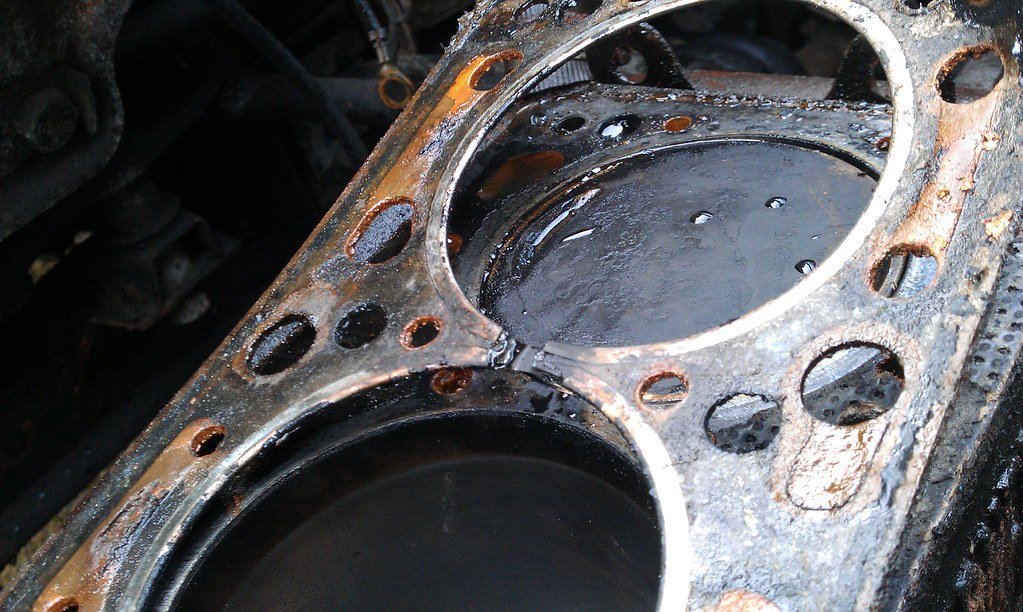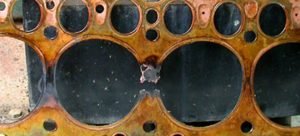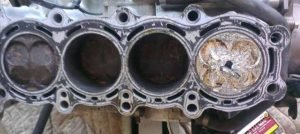
Signs of a blown head gasket includes white smoke, coolant loss and many others. Head gasket, provides the seal between the engine block and cylinder head.
One of the more common causes for a blown head gasket is coolant leaks. Coolant leaks are usually caused by problems with the cooling system, such as clogged radiator hoses, cracked radiator hoses, or a leaky water pump.
A leak in any of these parts will cause coolant to mix with the engine oil and create sludge on top of the engine’s cylinder wall. This sludge is what causes the head gasket to blow out.
When the head gasket is blown, coolants is said to leak into the combustion chamber. If coolants finds there way into the combustion chamber, it creates a white or grey-colored smoke that comes from the tailpipe.
Symptoms of a Bad Head Gaskets
Contents

Replacing your head gasket is a good investment. A bad head gasket can cause the engine to overheat and have other serious consequences.
Common symptoms of a bad head gasket are:
- -Engine overheating
- -Excessive oil consumption
- -Coolant leakage into the combustion chamber
Head gasket failure is the most common cause of engine coolant leaks. Even if you don’t see any coolant, it’s very likely that you have a head gasket leak.
Major Causes of Blown Head Gaskets
There are many different reasons for blown head gaskets. One of the most common is excessive heat.
It can happen when the engine is extremely hot and the car is not running properly. But if you notice your car’s engine getting really hot, it is best to stop driving immediately and take it to a mechanic so they can diagnose what’s going on.
A blown head gasket can happen for several reasons. These are just some of the major causes that people often overlook.
The three most common causes are –
- The build-up of combustion by-products on the piston rings,
- Coolant mixing with oil, and
- Excessive pressure in the crankcase.
The white or grey-colored smoke in the case of a blown chamber continues as long as the engine is running. This is different from the visible tailpipe smoke that comes out of your car in the morning when warming it.
Common causes of a blown head gasket
Overheating is prominent and the primary cause of a blown head gasket in a car. The cooling system in the car is meant to regulate engine temperature in any whether. Specifically, the four main causes of blown head are
- Overheating
- Preignition/detonation
- Hot spots
- Bad installation
These four reasons listed above are the in general the major causes of a blown head gasket. To be more specific, there other underlining factors that usually leads the one or all of the causes.
For example, overheating is caused majorly by coolant leak, clogged radiator or any form of malfunction in the cooling system. Although there are many other factors that could cause overheating itself.
Causes of Overheating In Car
Identifying the main cause is overheating that caused a blown head gasket is important as this will help pin point the actual fault faster. Below is the list of the major causes of overheating in a car.
- Coolant or antifreeze Leak
- Failing radiator fan
- Bad EGR system
- Clogged radiator
- Broken Thermostat
- Failed water pump
- Loose serpentine belt
- Old and overdue coolant or antifreeze
- Improper moisture of antifreeze and water in the right proportion
- Loose pressure radiator cap
- Clogged radiator vale
All these are reason why your car could be overheating. If your engine overheats and its not been fixed on time then it will lead to damaging the head gasket.
Read Also
How Long do Led Headlights Last 3 Things To Know
Can you drive with a blown head gasket?
Yes you can drive a car with a blown head gasket but it is not a wise decision at all. If your continue driving a car with head gasket issues, engine parts like cam shaft or crank bearings are at greater risks of spoiling.
Coolants can leak into the engine’s combustion chamber making it mix with engine oil there by leading to less lubricating effect. Without the proper lubrication, this will quickly lead to bearing damage, and the need for an engine rebuild.
The longer you continue driving a car with a blown head gasket, the hotter the car’s engine become. Overheating will definitely lead to a lot of other big problems no car owner wants to hear.
Am very sure know car owner wants to hear any of this problems happens to there car if not because of hours work to fix it then for cost of fixing. The cost of replacing a blown head gasket is a lot that every car owner will not want to hear.
Is it safe to drive with a blown head gasket?
It is not safe to drive with a blown head gasket, not in any situation. The danger of driving with a blown head gasket is not all about your car’s engine but you in person is not safe either.
When the engine overheats, the coolant too gets overheated. In this condition if you try opening the bonnet you could get burnt.
Actually an overheated car could even start a real fire if its not treated with care. That’s why it’s all the more important to get hold of a head gasket sealer to fix your head gasket, fast.
How to prevent head gasket failure
Little little care is all that is needed to keep your car going in a good healthy condition. This little day to day will cost a little dollars compared to thousands of dollars that will be spent when the head gasket gets blown.
To keep your car’s engine gasket in good working efficient condition, follow the steps below
- Constant inspection for coolant leaks
- Time to time radiator checks
- Check replacement of bad thermostat
- Topping of coolant level as required
- Good fan and blade working condition
It is important to note that different head gaskets will falter at different stages and temperatures. Aluminum has a tendency to expand more quickly than other metals when it is heated, so an aluminum cylinder head is less desirable than other choices.
The maintenance cost as listed above is not as expensive as replacing the head gasket. Remember the English saying a stich in time saves nine, To avoid disappointments and premium repairs take proper care of your car.
Fix Blown head gasket at home
Like every other fixes, head gaskets too can be fix at home by yourself without a mechanics help. Yes i mean you can it yourself at home spending less money but this depends on the level in which the damage is.
If the head gasket issue is just manifesting and it has not cause any problems on other parts of the engine then you can manage it at home. There is a point where the damage is too great and you will need the expertise of a professional to replace the gasket.
How to Deal with Bad Head Gaskets

Bad head gaskets can cause a lot of damage to the engine and it might need to be replaced. There are several things that you should do if you think that your car’s head gasket is bad.
First, get your coolant system checked and make sure it is in good condition. Next, go to the auto parts store and get a radiator hose for your car; you can also buy a new radiator hose if needed.
Conclusion
If the radiator hose is okay, then it’s likely that the head gasket has failed and needs replacing. One of the most common causes of bad head gaskets is overheating.
The engine will start to overheat when the water pump gets damaged or dirty over time which will then lead to other problems such as clogged cooling. Remember that Overheating, Preignition/detonation, Hot spots and Bad installation are all signs of a blown head gasket.
Look out for this signs and symptoms to avoid further problems and disappointments. If you still have any further questions please use the comment box to ask.

Leave a Reply
You must be logged in to post a comment.